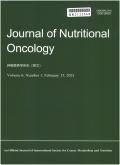The Association of Diet-Modulated Gut Microbiota on Development and Treatment of Colorectal Cancer
引用次数: 0
Abstract
Abstract: Colorectal cancer is the third most common cancer worldwide. Etiology of colon cancer continues to be investigated with research findings ranging from environment to diet to inherited gene mutations. Risk factors associated with colon cancer include familial history of colon cancer and inflammatory bowel disease, as well as lifestyle-related modifiable influences like diet, weight, and exercise. Recent findings point to the connection between diet and gut microbiota, which is highly affected by changes in diet promoting either an environment of beneficial bacteria or dysbiosis. Dietary effects on the microbiome can impact health outcomes, including an increased risk for colorectal cancer. Although the mechanisms behind the effect of gut microbiota on the development of colorectal cancer continues to evolve, its effect on both inflammation and immune response may play a key role. Further, after development of colorectal cancer diagnosis, the changes to gut microbiota have a potential to continue to influence the effectiveness of therapy and treatment. This review presents the current knowledge around the diet-modulated gut microbiome and its association with, risk for, development of, and treatment of colorectal cancer. Overall, further research on dietary elements that affect the gut microbiome and its subsequent effect on development and treatment of colorectal cancer is needed for applicable recommendations that can be made for dietary modulation of the gut microbiota for improved health outcomes.饮食调节肠道微生物群与结直肠癌发展和治疗的关系
摘要:结直肠癌是全球第三大常见癌症。结肠癌的病因学仍在继续研究,研究结果从环境到饮食再到遗传基因突变。与结肠癌相关的风险因素包括结肠癌和炎症性肠病的家族史,以及与生活方式相关的可改变的影响,如饮食、体重和锻炼。最近的研究结果指出了饮食和肠道微生物群之间的联系,这受到饮食变化的高度影响,饮食变化要么促进有益细菌的环境,要么促进生态失调。饮食对微生物群的影响会影响健康结果,包括增加患结肠直肠癌的风险。尽管肠道微生物群对结直肠癌发展影响的机制仍在不断发展,但其对炎症和免疫反应的影响可能起着关键作用。此外,在结直肠癌诊断后,肠道微生物群的变化有可能继续影响治疗和治疗的有效性。这篇综述介绍了目前关于饮食调节肠道微生物群及其与结直肠癌的风险、发展和治疗的关系的知识。总的来说,需要进一步研究影响肠道微生物群的饮食元素及其对结直肠癌发展和治疗的后续影响,从而提出适用的建议,通过饮食调节肠道微生物群来改善健康结果。
本文章由计算机程序翻译,如有差异,请以英文原文为准。
求助全文
约1分钟内获得全文
求助全文

 求助内容:
求助内容: 应助结果提醒方式:
应助结果提醒方式:


